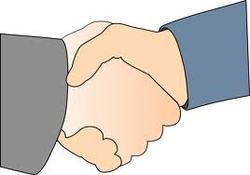Handshake Puzzle
 At a party, everyone shook hands with everybody else exactly once. There were 66 handshakes. How many people were at the party?
At a party, everyone shook hands with everybody else exactly once. There were 66 handshakes. How many people were at the party?
Details and Assumptions :
- You can't shake your own hand.
This section requires Javascript.
You are seeing this because something didn't load right. We suggest you, (a) try
refreshing the page, (b) enabling javascript if it is disabled on your browser and,
finally, (c)
loading the
non-javascript version of this page
. We're sorry about the hassle.
7 solutions
Discussions for this problem are now closed
What if only negative people are in the room? ;-)
The first person will shake hands with everyone else (n-1).
The second will shake hands with all except the first person (n-2), and so on.
The simple way to look at it is that it will be sum of the integers up to (n-1), i.e. a triangle number. 66 is the 11th triangle number, so the number of people in the room is 12.
A more mathematical way would be to use the formula to sum the terms: n(n-1)/2 = 66.
This can be seen from adding the first and the last term together (n-1) + 1 = n. If we add the second and second to last term we also get n, and so on. We can do this half the number of total terms: (n-1)/2, and thus the equation which solves to 12.
Number of handshakes = 2 n ( n − 1 ) = 6 6
n 2 − n = 1 3 2
n 2 − n − 1 3 2 = 0
n 2 + 1 1 n − 1 2 n − 1 3 2 = 0
n ( n + 1 1 ) − 1 2 ( n + 1 1 ) = 0
( n + 1 1 ) ( n − 1 2 ) = 0
So, values of n = 1 2 and − 1 1
But, n cannot be negative.
Thus, the answer is: n = 1 2
I did see you have the same solution.
n C 2 = 2 ! ( n − 2 ) ! n !
n C 2 = 2 ! n ( n − 1 )
n 2 − n = 2 ! ( 6 6 )
n 2 − n = 1 3 2
n 2 − n − 1 3 2 = 0
( n − 1 2 ) ( n + 1 1 ) = 0
n = 1 2 , − 1 1
Here n cannot be negative as well as we all know a negative quantity doesn't exist so n = 1 2
We can think of handshakes as a relation R between people on a set S, where aRb (a has shaken hands with b) and bRa exist for all a and b in S, and there exists no element xRx for all x in S. In other words, you can't shake your own hand.
With that all in mind, we can calculate the number of elements are in our relation, assuming S is order n as: n^2 - n. (number of elements in our relation assuming every relation between elements of S is possible, minus the only ones that aren't possible in our relation, the n reflexive relations from an x to itself -- shaking your own hand.)
This then leaves us with twice the number of handshakes we need, since we aren't counting aRb and bRa as distinct relationships, so:
(n^2-n)/2, or factored out into the more familiar formula: n(n-1)/2 is the number of handshakes occur if n people have shaken hands with everyone else.
Now, solving for n in terms of h:
n = 1/2(sqrt(8h+1)+1)
substituting in n=66 then gives 12.
12
In general, with n+1 people, the number of handshakes is the sum of the first n consecutive numbers: 1+2+3+ ... + n. Since this sum is n(n+1)/2, we need to solve the equation n(n+1)/2 = 66. This is the quadratic equation n2+ n -132 = 0. Solving for n, we obtain 11 as the answer and deduce that there were 12 people at the party.
Since 66 is a relatively small number, you can also solve this problem with a hand calculator. Add 1 + 2 = + 3 = +... etc. until the total is 66. The last number that you entered (11) is n.

n C 2 = 2 ! ( n − 2 ) ! n !
n C 2 = 2 ! n ( n − 1 )
n 2 − n = 2 ! ( 6 6 )
n 2 − n − 1 3 2 = 0
( n − 1 2 ) ( n + 1 1 ) = 0
n = 1 2 , − 1 1 but n can't be negative
Or you may solve it this way: The first person would be making n − 1 handshakes as he won't with himself. The second person would make n − 2 as he wont shake hands again with the first and to himself. The third would make n − 3 , the fourth n − 4 and so on till there are only 2 left to make 1 handshake. If you add all of these we get 1 + 2 + 3 + . . . + ( n − 1 ) = 2 ( n − 1 ) ( n ) = 6 6